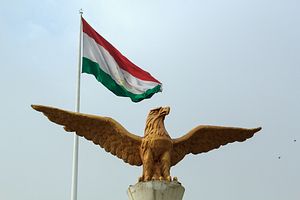In his third visit to Indonesia, Tajikistan’s President Emomali Rahmon met with Southeast Asian leaders and attended the 12th World Islamic Economic Forum, which brought together a reported 2,500 delegates from more than 65 countries on August 2. Tailoring his message to the audience, Rahmon called on developed Islamic countries to help out less-developed ones.
Rahmon met with Indonesian President Joko Widodo, also known as Jokowi, ahead of the forum. The two leaders seemed to have stuck to the traditional script, mentioning the space for increased economic cooperation and tourism. Rahmon, in particular, called on Indonesian companies to invest in Tajikistan. As Asia-Plus reports, both sides pointed to areas for increased two-way trade–tourism, technology, construction–but it’s Tajikistan that seeks to truly benefit from Indonesia’s economy.
The documents signed between Rahmon and Jokowi were fairly standard: a joint communique, an agreement to grant visa-free access to people with diplomatic passports, an MoU on training diplomatic personnel, an MoU on security cooperation, and also one on financial cooperation. The latter two focused specifically on combating transnational terrorism and the financing thereof.
Rahmon also met with the Malaysian and Sri Lankan prime minsiters–Najib Razak and Ranil Wickremesinghe–with many of the same issues on the table: construction projects, tourism, and terrorism.
In his opening remarks at the forum, Jokowi commented, “The world is facing the age of unprecedented innovation of artificial intelligence and genetic engineering, yet at the same time we live in an unprecedented instability, inequality, security threats all around the world and fragile economic recovery.” The Jakarta Post noted that Jokowi highlighted “Islamic fashion, cuisine, arts and architecture,” as having “the potential to create a new international economy.”
As I commented yesterday, many of the efforts on the part of Central Asian leaders to distill and define their local culture have targeted what are perceived as foreign, in particular Islamic, influences. As with Rahmon’s January visit to Mecca, Tajikistan walks a strange line in highlighting its connection to the Islamic world when convenient while also fanning the flames of Islamophobia with its own borders.
In 2015, according to the Khatlon region’s police and reported by RFE/RL’s Tajik service, 12,818 men who “had overly long and unkempt beards” were “brought to order.” Nearly 90 hijab-wearing prostitutes were arrested and 1,773 women and girls were convinced to not wear headscarves.
Forced beard shavings and anti-hijab proselytizing are just two of a number of odd stories that illustrate Tajikistan’s fundamental wrestling with growing Islamic influences in public life–particularly trends associated with the Middle East. Such imports come with increased connections — through tourism, education, business. But halting the flow is a difficult endeavor. While the state banned children under 18 from attending mosque, Rahmon posed in construction equipment starting work in 2011 on what’s been branded Central Asia’s largest mosque–70 percent financed by Qatar. Earlier this summer, Asia-Plus reported that it was finally nearing completion.
As Tajikistan’s government seeks to attract investment from states and organizations that may have fewer qualms about corruption or human rights, it seems also to seek to identify with the global Islamic community–no matter how uncomfortable it is with that same community at home.
In Jakarta, Rahmon met also with the president of the Islamic Development Bank, Ahmad Mohamed Ali. The bank–which is based in Saudi Arabia–has apparently approved nine projects in Tajikistan for the 2016-2018 period.

































